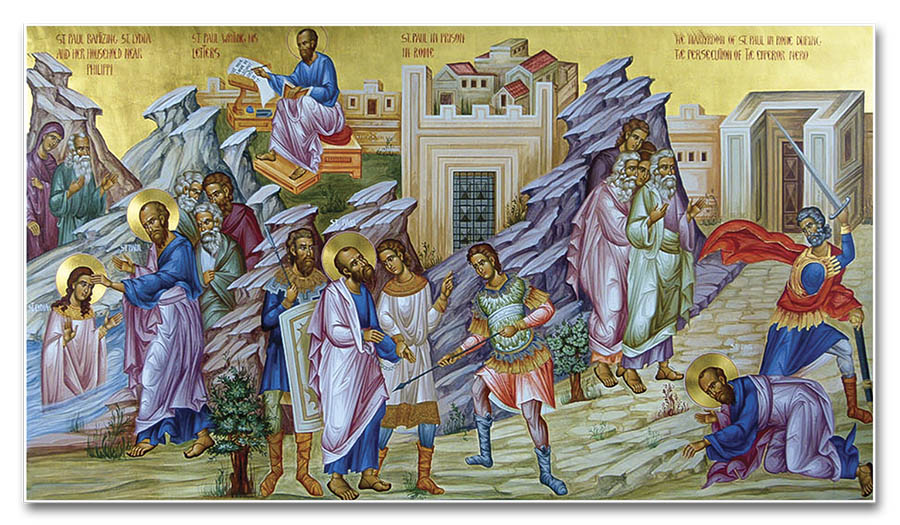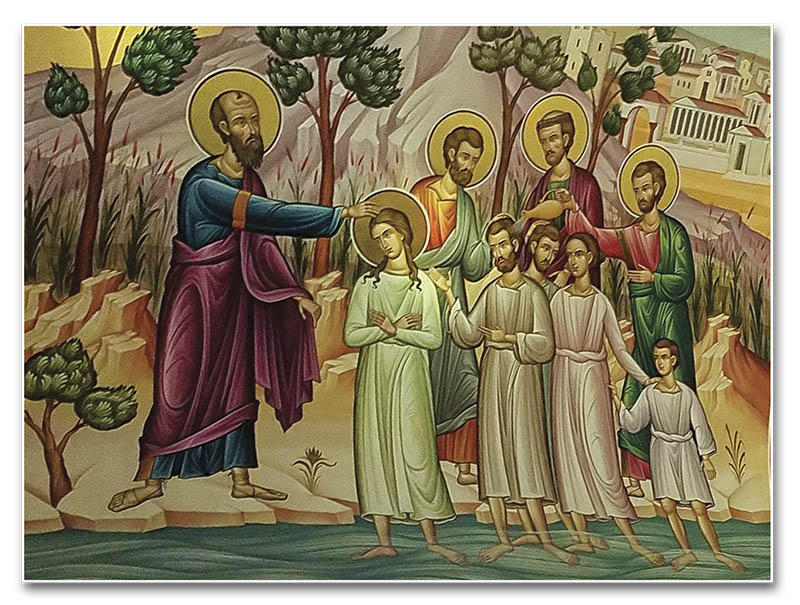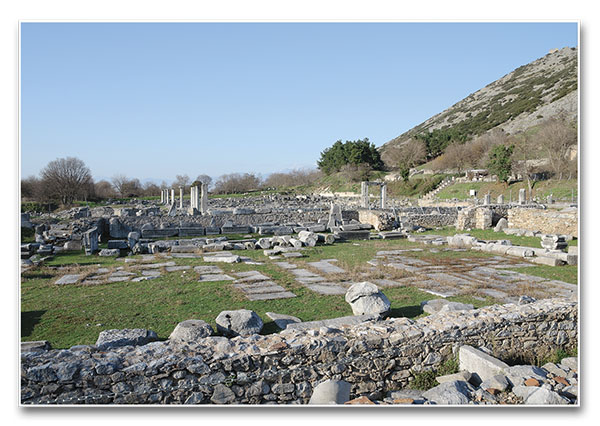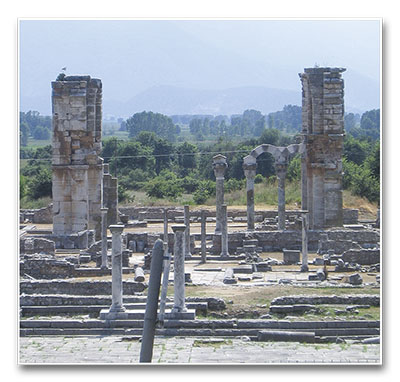To her remarkable virtues, Lydia added an unmitigated self-effacement. Little is known of her story, but her faithfulness to God’s call marked the blossoming of the Church in Philippi and throughout Europe.
As we read the narration of the public life of Our Lord, our attention is drawn to some of the feminine figures that appear; such as the mother-in-law of St. Peter, who, after being cured of a fever, began to serve the Saviour (cf. Mt 8:14-15); or the Canaanite woman who implored peace for her possessed daughter and whose great faith moved the God made Man himself (cf. Mt 15:21-28); or again the woman suffering from haemorrhages, who had such trust in the Divine Master’s power that she was freed from her illness simply by touching His sacred garments (cf. Mk 5:25-29).
And what can we say of the Samaritan woman to whom Jesus offered the living water? Not content with having found salvation for herself, she hastened to bring the Good News to everyone in her city (cf. Jn 4:7-42).
We cannot fail to also consider those who followed Our Lord more closely in His evangelizing mission, so as to provide for His needs (cf. Lk 8:1-3). Certainly influenced by the supreme and most perfect example of the Blessed Virgin Mary, Mother and Bulwark of the Church, the Holy Women are a precious model of dedication and burning love for the Divine Lamb. Overcoming the weakness of their nature, they accompanied Him to Calvary and later staunchly proclaimed His victorious Resurrection.
In the wake of these great women who shine for their virtue in the nascent Church, we find, yet in the first century, a soul of whom little is said. However, the Liturgy briefly recounts her story during the Easter Season in order to discreetly highlight her connection with the preaching of the Word.
To better understand the role she was called to play, let us take a journey. We will embark with Paul, Luke, Timothy and Silas on a ship that is about to leave from the port of Troas.
Journey to Macedonia
Initially, the Apostle of the Gentiles wanted to evangelize Bithynia; however, the Spirit of Jesus prevented him. One night, when he had gone down to Troas, a Macedonian implored him in a dream to come to his aid. Recognizing in this a higher divine design, St. Paul and his three companions set out on their journey – together with us!
After passing through Samothrace, we reach Neapolis and finally Philippi, the principal city of that part of Macedonia, where our group stays for some days… (cf. Acts 16:6-12).
This city had been founded by Thasians in the fourth century BC. It was originally called Krenides, a word that means springs, which seems very symbolic, because from there – the first European territory evangelized – would flow abundant graces that would give impetus to the life of the Church in the region. In 360 BC, Philip II of Macedonia had rebuilt it, establishing his residence there, whence came its name. In 31 BC, Philippi had become a Roman colony.1
However, any remarkable event that this city witnessed over the course of history loses its lustre as compared with what is now taking place:
“[There landed] the proclaimers of a new freedom, heralds of another conqueror of the universe, who without a sword would do more for the liberation of the world than all the champions of freedom put together!”2
First fruits of the apostolate
During our stay in Philippi, one Sabbath, we walk outside the city gate to the historic Gangites River, where there seems to be a place of prayer. Some women are gathered there (cf. Acts 16:13), who “did not possess great knowledge, it is true, but they were animated by a lively religious desire, and those who possess this are carried further by God. In the presence of these good women, Paul could give free rein to his heart.”3
Among these pious souls, one of them is particularly worthy of note: Lydia, a merchant of purple goods from the city of Thyatira, who listens attentively. The Lord opens her heart to respond to Paul’s message, and so she asks to be baptized with her whole family (cf. Acts 16:14-15).

In the midst of our apostolate, Lydia stands out for the impressive rapidity and depth of her conversion. And not content with this, she asks us: “If you have judged me to be faithful to the Lord, come to my house and stay” (Acts 16:15). Faced with such a touching offer, we are evidently obliged to accept…
Let us end our unique journey here, and remain as guests in the house of our neophyte. We will thus be able to analyse this pious figure more closely.
Detached from the things of the world
Thyatira was in the region of Lydia in Asia Minor. Because our character was a foreigner to Philippi, she had probably become known as “Lydia”, that is, as one who came from Lydia.
For a long time, her homeland had been distinguished by the purple goods trade. This pigment was, without doubt, the costliest in ancient times. And rightly so! To obtain it, thousands of molluscs from the murex genus had to be gathered from the coasts of the Mediterranean Sea. The glands of these animals secreted a white fluid which, when exposed to sunlight, gradually took on a purple colour. However, we can only have a clear notion of how arduous this work was if we take into account that ten thousand molluscs were needed to extract about one gram of pigment!
Perhaps for this reason, only emperors, kings and high-ranking dignitaries wore garments so dyed, making them very profitable merchandise.
However, this lady was detached from the things of the world. Scripture describes her as “a worshiper of God” (Acts 16:14), that is, turned towards Him. “Lydia possessed one of those souls so naturally Christian that, having heard of Jesus, she immediately recognized Him as the Way, the Truth and the Life.” 4
A soul endowed with precious qualities
It is also striking that Lydia did not keep the joy of her conversion to herself, but wanted to win those closest to her for Christ. Josef Holzner describes her decision well: “She was a prudent and thoughtful woman. An adroit businesswoman knows how to examine everything carefully. In this case, however, she did not hesitate or reflect for an instant. With extraordinary alacrity, she decided to receive Baptism. […] A resolute and firm businesswoman, gifted with a housewife’s commanding voice and accustomed to exercising authority, Lydia soon led all the servants of her house to Baptism. Moreover, given her extreme assiduousness, it is natural that she was active not only in Philippi but also in her hometown, Thyatira.”5

Another extraordinary quality manifested by our purple goods merchant was her generosity in striving to give the best to the Lord’s envoys. From then on, her wealthy residence would be the resting place for the missionaries and the community where the Christians of the region would gather for the celebration of the holy mysteries. “In this way, Lydia’s home became […] the first church in Europe.”6
It was not St. Paul’s custom to accept donations easily (cf. 2 Cor 11:9; 1 Thes 2:9; 2 Thes 3:8), which could make him the target of calumnies, such as the claim that he “evangelized” for profit. Nevertheless, as the Acts of the Apostles narrates, Lydia “prevailed upon” (cf. Acts 16:15) them to accept her offer, thus manifesting her remarkable personality and strength of will.
St. John Chrysostom expresses his admiration for this holy woman in the following words: “See the prudence of Lydia, how she insists with the Apostles! With what humility and wisdom she speaks to them: ‘If you have judged me to be faithful to the Lord!’ Nothing could be more effective in persuading them. Who would not be moved by these words? More than begging and leaving it to the discretion of the Apostles to go to her house or not, she obliges them with her words: ‘She prevailed upon us.’ See how she soon bears fruit, and how the vocation seems to her a priceless good.”7
St. Paul’s appreciation for the Philippians

The Holy Scriptures do not specify how many days they stayed in Philippi. It is known, however, that St. Paul held the faithful of that region in great esteem. Despite the persecution he suffered there (cf. Acts 16:16-40), the love that the Philippians had for God deeply marked the Apostle’s soul, as he himself shows in his letter: “It is right for me to feel thus about you all, because I hold you in my heart, for you are all partakers with me of grace, both in my imprisonment and in the defence and confirmation of the Gospel. For God is my witness, how I yearn for you all with the affection of Christ Jesus” (Phil 1:7-8). Further on he calls them “my brethren, whom I love and long for, my joy and crown” (Phil 4:1).
After Paul’s departure, the Philippians remained united in spirit to him who had begotten them in Christ Jesus (cf. 1 Cor 4:15). So much so that, some time later, when they learned of the trouble their dear spiritual father was undergoing in his missionary exploits, they sent him all that was necessary, and even what was superfluous (cf. Phil 4:16-18). It would not be surprising if many of these gifts came from the hands of his faithful disciple Lydia…
The value of a “yes” to God’s will
In the Mystical Body of Christ, when one member is faithful to grace, all the others benefit from it; when, on the contrary, someone is unfaithful, the whole is harmed. Each soul has a specific “weight” in this communion, according to the designs that God has reserved for it.
What, then, would have been the ‘value’ of Lydia, the first convert on European soil? It is a difficult enigma to decipher… Especially because, to her remarkable virtues, she knew how to add an unmitigated self-effacement.

Little is known of her history, but it is certain that, following the example of the Blessed Virgin (cf. Lk 1:38), she gave her prompt and generous “fiat” to the will of God, thus cooperating in the spreading of the Gospel. The words addressed to the Angel of the Church of Thyatira in the Book of Revelation could well be applied to Lydia: “I know your works, your love and faith and service and patient endurance, and that your latter works exceed the first” (2:19).
At the end of her life, her soul must have ascended to God’s presence like an offering of sweet odour! And it does not seem an exaggeration to think that, with her correspondence, she collaborated powerfully so that the Holy Church could be established over the entire European continent.
Included in the register of the Saints
Although we lack information on how the cult of St. Lydia was established, the signs of her sanctity are well indicated by her prompt response to the invitation of grace. We only know that it was Cardinal Cesar Baronio, entrusted by Pope Gregory XIII with the revision of the Roman Martyrology in the 16th century, who introduced her into the catalogue of the Saints.8
Considered the patroness of merchants, we can also invoke her if we want the Lord to open our hearts, as He did hers, and make us fervent recipients of His graces and His designs! ◊
Notes
1 Cf. MARTÍNEZ PUCHE, OP, José A. (Dir.). Nuevo Año Cristiano. 3.ed. Madrid: Edibesa, 2002, v.VIII, p.78.
2 HOLZNER, Josef. Paulo de Tarso. Lisboa: Aster, 1958, p.200.
3 Idem, p.201.
4 Idem, ibidem.
5 Idem, p.202.
6 SGARBOSSA, Mario; GIOVANNINI, Luigi. Um Santo para cada dia. 13.ed. São Paulo: Paulus, 2006, p.231.
7 ST. JOHN CHRYSOSTOM. In Acta Apostolorum. Homily XXXV: PG 59, 253.
8 Cf. LEITE, SJ, José (Org.). Santos de cada dia. 3.ed. Braga: Apostolado da Oração, 1994, v.II, p.501.







